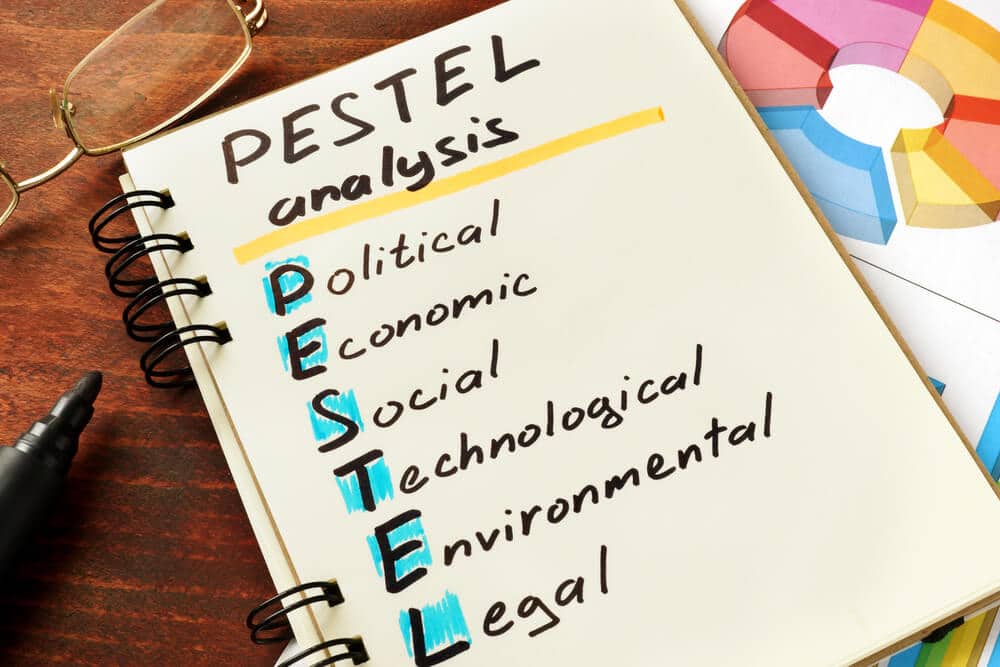Everybody knows that Sweden is famous for its beautiful forests and lakes. However, besides tourists, businesses also find Sweden attractive.
Sweden is considered very accommodating to businesses. So, if you're interested in learning about Sweden's business environment, this article is perfect for you.
Whether you are an entrepreneur looking to expand your business or a student researching Sweden's business environment, this article is a must-read since today we have decided to conduct a Sweden PESTLE Analysis.
This article will discuss the external factors that impact businesses operating in Sweden. So, come along and discover Sweden's opportunities and challenges for businesses in various industries.
Sweden has a rich history of culture and heritage. The history of Sweden dates back to prehistoric times when the first human settlements appeared in the country.
Sweden was a major power in northern Europe during the Viking Age, from the 8th to the 11th century. The Vikings were known for their seafaring skills and were feared by many other European nations.
In the Middle Ages, Sweden was a relatively poor country. It was ruled by several kings who often struggled for power with the nobility. In the 16th century, the country underwent a significant transformation with the arrival of the Protestant Reformation.
The Swedish king Gustav Vasa led the country through this period of change. He established the Lutheran Church as the state religion. During the 17th century, Sweden emerged as a major European power under the rule of King Gustavus Adolphus.
He led Sweden through the Thirty Years' War. He expanded the country's territories to include parts of modern-day Germany, Poland, and Russia. However, after his death, Sweden's power began to decline.
In the 18th century, Sweden lost many territories and became a smaller and more peaceful country. Sweden was ruled by an absolute monarchy during this time, with the king having almost unlimited power.
In the 19th century, Sweden began to experience rapid industrialization and modernization. As a result, the country transitioned to a constitutional monarchy and introduced a democratic system of government.
Sweden remained neutral during World War I and World War II, which helped it avoid the devastation many other European countries suffered during these conflicts.
After World War II, Sweden experienced an economic boom. The Swedish model is based on a strong welfare state and a mixed economy.
Sweden became one of the world's wealthiest and most equal countries, with a high standard of living for its citizens. Sweden has continued to evolve in recent years and become known for its innovative technology and progressive policies.
Today, Sweden is a member of the European Union and is a major player in global politics and economics. The country remains a model of social democracy, with a strong emphasis on equality, environmentalism, and individual rights.
Now that we have an insight into Sweden let's discuss what PESTLE analysis is. PESTLE analysis is a tool that analyses how different external factors impact a state's business environment. Now that you know a bit more about PEST analysis, let's proceed with Sweden's PESTLE analysis.

Political Factors That Affect Sweden
Political factors refer to government policies, laws, and regulations that impact the country's economic, social, and cultural landscape.
Sweden is a stable democracy with a long history of political stability. The country has a well-established system of government, with a constitutional monarchy and a parliamentary democracy.
The government is known for its progressive policies, particularly in social welfare and environmental protection. In addition, Sweden's political stability and progressive policies make it an attractive country for businesses and foreign investment.
Sweden's government also pays great attention to tax policies. As a result, Sweden's tax policies can be seen as business-friendly because they support a strong and stable economy and social programs that contribute to the quality of life for citizens.
While the high tax rates may challenge some businesses, the government offers incentives and benefits to encourage investment in research and development and environmentally sustainable practices.
Besides that, Sweden has low trade barriers, which attracts businesses. Furthermore, Sweden's open and free trade policy is generally seen as beneficial for businesses, providing access to a large market and opportunities for growth and investment.
The government's support for international trade and investment, with a highly skilled workforce and a strong culture of innovation, makes Sweden an attractive location for businesses looking to expand internationally.

Economic Factors That Affect Sweden
Sweden is a highly developed and prosperous country with a mixed-market economy. However, several economic factors can impact its growth and stability.
In 2021, Sweden's GDP was $635.6 billion. The Swedish economy is largely driven by the services sector, contributing to approximately 65% of the country's GDP.
The manufacturing industry also plays a significant role, contributing to about 23% of the GDP. Sweden's economy is export-oriented, with the country being one of the world's largest exporters of goods and services.
The country has a diversified economy, with major industries including telecommunications, automotive, pharmaceuticals, biotechnology, and forestry. Therefore, businesses operating in these industries can have an edge in Sweden.
Besides that, the inflation rate in Sweden has been relatively low and stable in recent years, hovering around 1-2% annually.
This has generally been seen as a positive development for businesses, as it helps to keep costs stable and predictable. In addition, low inflation also indicates a stable and healthy economy, which can provide a favorable business environment.
However, inflation can still impact businesses in Sweden, particularly in sectors such as retail and manufacturing.
Inflation can lead to higher costs for raw materials and other inputs, squeezing profit margins. Additionally, inflation can lead to higher interest rates, increasing business borrowing costs.
Moreover, the exchange rate between the Swedish krona (SEK) and the US dollar (USD) has been somewhat volatile in recent years, with fluctuations driven by various factors, including global economic conditions, political developments, and shifts in trade patterns.
Generally speaking, a weaker Krona can benefit Swedish businesses that export goods and services, making their products more competitive globally.
However, a weaker krona can also make it more expensive for Swedish businesses to import goods and raw materials from other countries, increasing costs.
Conversely, a stronger krona can benefit businesses that import goods, as it can reduce the cost of purchasing foreign products.
However, a stronger krona can also make Swedish exports more expensive on the global market, potentially reducing demand for these products.

Social Factors That Affect Sweden
Social factors are essential to a PESTLE analysis as they can greatly influence a country's economic growth and development. In the case of Sweden, several social factors have an impact on the business environment.
One of Sweden's most significant social factors is its highly educated workforce. With a literacy rate of 99%, Sweden has a highly skilled and knowledgeable workforce that is well-equipped to tackle complex business challenges.
This well-educated workforce has contributed to Sweden's reputation for innovation and excellence in technology and engineering.
Another important social factor in Sweden is its robust social welfare system. The Swedish government provides a wide range of social services, including healthcare, education, and public transportation, accessible to all citizens.
This results in a highly egalitarian society that values equal opportunities for all, regardless of background or social class. In addition, this creates a supportive environment for businesses that are committed to social responsibility and sustainability.
Sweden is also known for its high standard of living, which is reflected in the country's high levels of consumer spending. As a result, the Swedish population has a relatively high disposable income, which makes them a lucrative target market for businesses selling luxury and high-end products.
This high standard of living also creates a positive perception of Sweden, which can help businesses build brand loyalty and increase customer satisfaction.

Technological Factors That Affect Sweden
Technological factors are one of the key components of a PESTLE analysis and significantly impact businesses operating in any country, including Sweden.
Sweden's well-developed infrastructure provides an excellent foundation for businesses to leverage technology. In addition, the country has a high level of internet penetration, with more than 90% of the population having access to the internet.
This makes it easier for businesses to reach customers through digital channels and conduct online transactions. Additionally, Sweden's extensive fiber-optic network ensures reliable and fast internet connectivity across the country, which is essential for businesses relying on digital technology.
Another important technological factor that affects businesses in Sweden is the country's investment in research and development. Sweden is home to some of the world's most innovative companies, such as Ericsson, Volvo, and Ikea. It has a robust research and development infrastructure.
The Swedish government invests heavily in research and development. As a result, the country has many patents per capita.
This creates a favorable environment for businesses operating in Sweden, as they have access to cutting-edge technology and can partner with local research institutions to develop new products and services.

Legal Factors That Affect Sweden
This section will discuss the legal factors that impact the operations of businesses that operate in Sweden.
Labor laws in Sweden are very employee-friendly, with strict regulations on working hours, holidays, and benefits. The government also requires companies to comply with strict health and safety regulations to ensure a safe working environment for employees.
These regulations often result in higher labor costs for companies operating in Sweden. However, they also ensure that employees are well-protected, leading to a highly productive and satisfied workforce.
Moreover, regulations in Sweden are well-defined and strictly enforced, providing businesses with a stable and predictable environment. Swedish regulations cover everything from environmental and safety standards to accounting and financial reporting requirements.
Companies must comply with these regulations to operate in the country. However, adherence to these regulations often requires significant investments in compliance-related activities, such as reporting and monitoring.
Besides that, competition laws in Sweden play a crucial role in promoting fair competition and protecting businesses and consumers.
By ensuring that businesses operate in a competitive and fair environment, competition laws help businesses to compete on a level playing field, protect consumers by promoting fair prices and product choices, and encourage innovation and growth in the market.

Environmental Factors That Affect Sweden
Environmental factors play a crucial role in the success of businesses in Sweden. Therefore, Sweden strongly emphasizes sustainability and environmental protection and has become a global leader in green technologies and practices.
As a result, businesses that operate in Sweden need to consider these factors carefully to remain competitive and meet the expectations of their customers and stakeholders.
One of the most significant environmental factors affecting businesses in Sweden is the country's commitment to reducing carbon emissions and combating climate change.
Sweden has set a goal of achieving net-zero emissions by 2045, which means businesses must reduce their carbon footprint and invest in renewable energy and other sustainable practices.
This focus on sustainability has led to the developing of innovative solutions and technologies that can help businesses reduce their environmental impact while improving their bottom line.
Another key environmental factor in Sweden is the importance of recycling and waste reduction. The country has a well-established waste management and recycling system, with high levels of recycling and composting.
Businesses operating in Sweden must comply with strict regulations around waste disposal and recycling, which can be both a challenge and an opportunity for those able to develop new and innovative waste reduction strategies.

Sweden PESTLE Analysis: Final Word
Sweden is a country that is famous for its beauty and rich culture. Besides that, Sweden is also an economically strong and developed country. It is considered among the top wealthiest economies worldwide.
Along with tourists, Sweden is an attractive destination for investors. Today, we conducted a Sweden PESTLE analysis to see what external factors impact the businesses operating in Sweden.
After reading this article, we assume you know the PESTLE analysis framework. If you want to read similar articles, look at some examples of PESTLE analysis.










